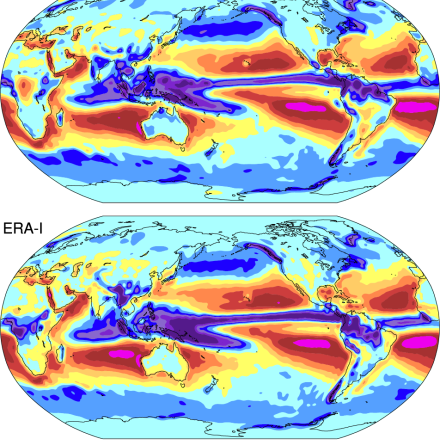Reanalysis
Comprehensive weather and climate datasets, reanalyses assimilate a variety of observations of the atmosphere, land surface, and ocean into a forecast model to provide a dynamically consistent estimate of the climate state at each time step.
Below is the atmospheric reanalysis overview page, which summarizes the attributes of the major atmospheric reanalyses. This section also includes selected oceanic reanalyses, although an overview is not available yet.
To find a specific reanalysis, jump to the search box below or click your desired reanalysis from among the blue sub-category buttons.
To see only the reanalyses pages accompanied by in-depth commentary, select the "Datasets with guidance" button when using the search box.
Dataset Overviews
Climate datasets
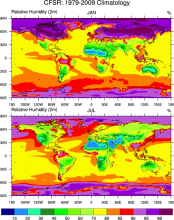 Climate Forecast System Reanalysis (CFSR)
Climate Forecast System Reanalysis (CFSR)
Years of record
- to
The CFSR is a third generation reanalysis product. It is a global, high resolution, coupled atmosphere-ocean-land surface-sea ice system designed to provide the best estimate of the state of these coupled domains over this period. The CFSR includes (1) coupling of…
Main variables and Earth System components
Atmosphere Air Temperature Geopotential Height Precipitable water Ocean-
Formats
- GRIB
-
Timestep
- Sub-daily, Monthly
-
Domain
- Global
-
Collections
- Climate Analysis Section (CAS) Data Catalog
Experts contributing reviews
- None
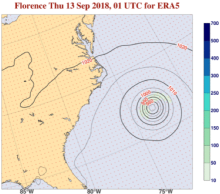 ERA5 atmospheric reanalysis
ERA5 atmospheric reanalysis
Years of record
- to
ERA5, the successor to ERA-Interim, provides global, hourly estimates of atmospheric, ocean-wave and land-surface variables, at a horizontal resolution of 31 km and 137 levels in the vertical from the surface to 0.01 hPa (about 80km). Produced by ECMWF on behalf of the…
-
Timestep
- Sub-daily, Daily, Monthly
-
Domain
- Global
-
Collections
- Diagnostic Data Sets
Experts contributing reviews
- Hersbach, Hans
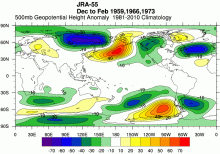 JRA-55
JRA-55
Years of record
- to
Spanning 1958-present, JRA-55 is the longest third-generation reanalysis that uses the full observing system (in contrast, products like ERA-20C and NOAA 20CR assimilate a very limited set of observations while NCEP R1 uses an antiquated model and assimilation scheme).…
Main variables and Earth System components
Atmosphere Air Temperature Geopotential Height Precipitable waterExperts contributing reviews
- Kobayashi, Shinya
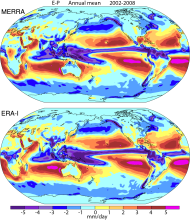 Atmospheric Reanalysis: Overview & Comparison Tables
Atmospheric Reanalysis: Overview & Comparison Tables
Years of record
Reanalysis a systematic approach to produce data sets for climate monitoring and research. Reanalyses are created via an unchanging ("frozen") data assimilation scheme and model(s) which ingest all available observations every 6-12 hours over the period being analyzed.…
Main variables and Earth System components
Atmosphere-
Formats
-
Timestep
-
Domain
Experts contributing reviews
- Dee, Dick | Fasullo, John | Shea, Dennis | Walsh, John
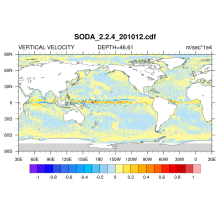 SODA: Simple Ocean Data Assimilation
SODA: Simple Ocean Data Assimilation
Years of record
- to
The Simple Ocean Data Assimilation, or SODA, analysis is an ocean reanalysis data set consisting of gridded variables for the global ocean, as well as several derived fields. The goal is to provide an improved estimate of ocean state from those based solely on…
Main variables and Earth System components
Wind Stress Ocean 3D Velocity potential temperature Salinity sea surface height SST - sea surface temperature u, v current componentsExperts contributing reviews
- None
 NASA's MERRA2 reanalysis
NASA's MERRA2 reanalysis
Years of record
- to
The Modern-Era Retrospective analysis for Research and Applications, version 2 (MERRA-2) is a global atmospheric reanalysis produced by the NASA Global Modeling and Assimilation Office (GMAO). It spans the satellite observing era from 1980 to the present. The goals of…
Main variables and Earth System components
Atmosphere Aerosols Air Temperature Geopotential Height Precipitable waterExperts contributing reviews
- Bosilovich, Michael | Cullather, Richard
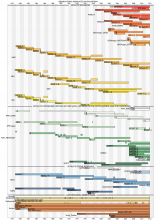 ERA-Interim
ERA-Interim
Years of record
- to
Using a much improved atmospheric model and assimilation system from those used in ERA-40, ERA-Interim represents a third generation reanalysis. Several of the inaccuracies exhibited by ERA-40 such as too-strong precipitation over oceans from the early 1990's onwards and…
Main variables and Earth System components
Atmosphere Air Temperature Geopotential Height Precipitable water Precipitation-
Timestep
- Sub-daily, Daily, Monthly
-
Domain
- Global
Experts contributing reviews
- Dee, Dick
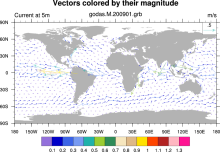 GODAS: NCEP Global Ocean Data Assimilation System
GODAS: NCEP Global Ocean Data Assimilation System
Years of record
- to
GODAS is a real-time ocean analysis and a reanalysis. It is used for monitoring, retrospective analysis as well as for providing oceanic initial conditions for the CFS. Both temperature and synthetic salinity profiles are assimilated in a 3DVAR scheme. Beginning with…
Main variables and Earth System components
Ocean 3D Velocity SST - sea surface temperature Salinity heat flux isothermal layer depth mixed layer depth potential temperature salt flux sea surface height-
Timestep
- Monthly, Pentad
-
Domain
- Global
-
Collections
- Climate Analysis Section (CAS) Data Catalog
Experts contributing reviews
- None
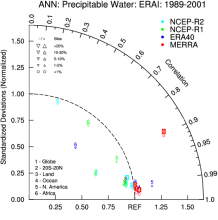 NCEP-NCAR (R1): An Overview
NCEP-NCAR (R1): An Overview
Years of record
- to
NCEP-NCAR (R1) is the original reanalysis effort. It uses a frozen global state-of-the-art global data assimilation system (as of 11 January 1995). The original database was enhanced (additional, quality checked datasets) by NCAR's Data Support Section. Originally planned…
-
Timestep
- Sub-daily, Daily, Monthly
-
Domain
- Global
Experts contributing reviews
- None
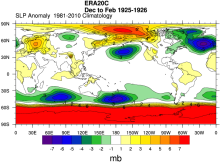 ERA-20C: ECMWF's atmospheric reanalysis of the 20th century (and comparisons with NOAA's 20CR)
ERA-20C: ECMWF's atmospheric reanalysis of the 20th century (and comparisons with NOAA's 20CR)
Years of record
- to
The ECMWF's first atmospheric reanalysis of the 20th Century, ERA-20C, provides a long, gridded dataset of many climate variables, spanning 1900-2010. Observations assimilated include surface pressures from the International Surface Pressure Databank v3.2.6 and…
-
Timestep
- Sub-daily, Daily, Monthly
-
Domain
- Global
Experts contributing reviews
- Poli, Paul
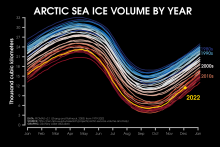 Pan-Arctic Ice Ocean Modeling and Assimilation System (PIOMAS)
Pan-Arctic Ice Ocean Modeling and Assimilation System (PIOMAS)
Years of record
- to
The Pan-Arctic Ice-Ocean Modeling and Assimilation System (PIOMAS) is a reanalysis data set that uses a coupled ice and ocean model to provide daily and monthly estimates of Arctic sea-ice thickness. The data is publicly available from January 1979 to in near-real time.…
Experts contributing reviews
- Labe, Zachary
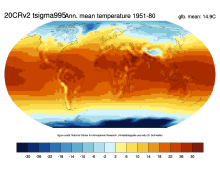 NOAA 20th-Century Reanalysis, Version 2 and 2c
NOAA 20th-Century Reanalysis, Version 2 and 2c
Years of record
- to
The Twentieth Century Reanalysis (20CR) provides a comprehensive global atmospheric circulation data set spanning 1850-2014. Its chief motivation is to provide an observational validation data set, with quantified uncertainties, for assessing climate model simulations of…
-
Timestep
- Sub-daily, Daily, Monthly
-
Domain
- Global
Experts contributing reviews
- None
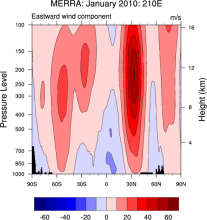 NASA MERRA
NASA MERRA
Years of record
- to
The Modern Era Retrospective-Analysis for Research and Applications (MERRA) was undertaken by NASA’s Global Modeling and Assimilation Office with two primary objectives: to place observations from NASA’s Earth Observing System satellites into a climate context and to…
Main variables and Earth System components
Atmosphere Air Temperature Geopotential Height Precipitable water Water Vapor-
Timestep
- Sub-daily, Monthly
-
Domain
- Global
Experts contributing reviews
- None
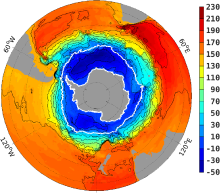 Southern Ocean State Estimate (SOSE)
Southern Ocean State Estimate (SOSE)
Years of record
- to
The Southern Ocean State Estimate (SOSE) is a model-generated best fit to Southern Ocean observations. As such, it provides a quantitatively useful climatology of the mean-state of the Southern Ocean. Technically, SOSE is a solution to the MITgcm. SOSE…
Main variables and Earth System components
Ocean 3D Velocity Bottom pressure SST - sea surface temperature Salinity Sub Surface Temperature mixed layer depth sea surface height u, v current components Wind Stress-
Formats
- binary
-
Timestep
- Daily, Monthly, Weekly, Annual
-
Collections
- None
Experts contributing reviews
- Mazloff, Matthew
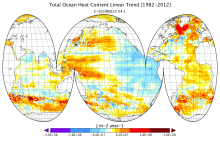 CMCC Global Ocean Reanalysis System (C-GLORS)
CMCC Global Ocean Reanalysis System (C-GLORS)
Years of record
- to
"The CMCC Global Ocean Physical Reanalysis System (C-GLORS) is used to simulate the state of the ocean in the last decades. It consists of a variational data assimilation system (OceanVar), capable of assimilating all in-situ observations along with altimetry data,…
Main variables and Earth System components
Ocean Ocean Heat Content SST - sea surface temperature Salinity Sub Surface Salinity Sub Surface Temperature mixed layer depth sea surface height u, v current componentsExperts contributing reviews
- Storto, Andrea
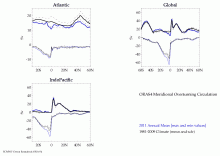 ORAS4: ECMWF Ocean Reanalysis and derived ocean heat content
ORAS4: ECMWF Ocean Reanalysis and derived ocean heat content
Years of record
- to
ECMWF's current ocean reanalysis uses a sophisticated data assimilation methodology which includes a model bias correction. The ocean model used is forced by atmospheric daily surface fluxes, relaxed to SST and bias corrected. The Balmaseda et al (QJRMS 2013) reference…
Main variables and Earth System components
Ocean Ocean Heat Content Salinity Sea Level potential temperature u, v current components-
Timestep
- Monthly
-
Domain
- Global
-
Collections
- Climate Analysis Section (CAS) Data Catalog
Experts contributing reviews
- None
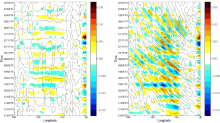 CERA-20C: ECMWF's Coupled Ocean-Atmosphere Reanalysis of the 20th Century
CERA-20C: ECMWF's Coupled Ocean-Atmosphere Reanalysis of the 20th Century
Years of record
- to
The CERA-20C is a global, coupled reanalysis spanning 1901-2010 with a focus on low-frequency climate variability. Similar to ERA-20C, the surface observations assimilated include surface pressures from the International Surface Pressure Databank v3.2.6 and ICOADS v…
Main variables and Earth System components
Atmosphere Multiple variables Cryosphere Sea Ice Concentration OceanExperts contributing reviews
- Laloyaux, Patrick
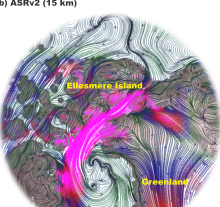 Arctic System Reanalysis (ASR)
Arctic System Reanalysis (ASR)
Years of record
- to
The Arctic System Reanalysis is a multi-agency, university-led retrospective analysis (reanalysis) of the Greater Arctic. ASR is produced using high-resolution versions of the Polar Weather Forecast Model (PWRF) and the WRF-VAR and High Resolution Land Data Assimilation (…
Experts contributing reviews
- None
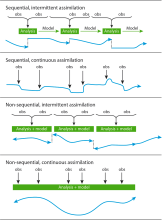 Simplistic Overview of Reanalysis Data Assimilation Methods
Simplistic Overview of Reanalysis Data Assimilation Methods
Years of record
Data assimilation is the process of combining observations from a wide variety of sources and forecast output from a weather prediction model. The resulting analysis is considered to be the 'best' estimate of the state of the atmosphere at a particular instant in time. The…
Main variables and Earth System components
Atmosphere-
Formats
-
Timestep
-
Domain
-
Collections
- None
Experts contributing reviews
- None
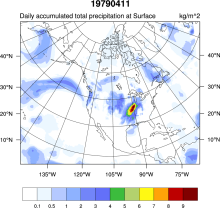 NCEP NARR
NCEP NARR
Years of record
- to
A high resolution (32km x 29 pressure levels) data set focused upon the North American Region. Relative to the NCEP-DOE (R2) it has a much improved land-hydrology, diurnal cycle and land-atmosphere interaction. As such, it can be considered a second generation reanalysis.…
Main variables and Earth System components
Atmosphere Air Temperature Geopotential Height Precipitable water Land-
Formats
- GRIB
-
Timestep
- Climatology, Sub-daily, Monthly
-
Domain
- North America
-
Collections
- None
Experts contributing reviews
- None
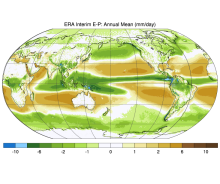 ERA-Interim: derived components
ERA-Interim: derived components
Years of record
- to
Era-Interim data are used to derive monthly mass, moisture and energy budget products. Each term is available. Atmospheric energy, mass, and moisture budgets can be computed by vertically integrating reanalysis fields and employing suitable corrections (e.g. mass). The…
-
Formats
- netCDF
-
Timestep
- Monthly
-
Domain
- Global
-
Collections
- Climate Analysis Section (CAS) Data Catalog
Experts contributing reviews
- None
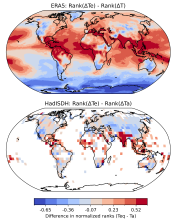 Equivalent Temperature: HadISDH.land and ERA5
Equivalent Temperature: HadISDH.land and ERA5
Years of record
- to
Equivalent temperature is a measure of heat in the atmosphere that accounts for the latent heat stored in water vapor in addition to sensible heat as measured by temperature. The equivalent temperature ($T_e$) scales linearly with the moist enthalpy (i.e., the temperature…
-
Formats
-
Timestep
- Monthly
-
Domain
- Global
-
Collections
- BAMS State of the Climate
Experts contributing reviews
- Matthews, Tom
